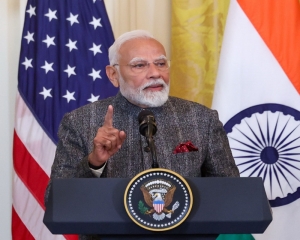Amid chants of 'Jai Bhim,' 'Bharat Mata Ki Jai,' and 'Lal Salam', candidates vying for president's post in the upcoming JNU students' union elections, delivered passionate speeches on national and international issues, including the violence in Manipur and the electoral bonds. A large crowd of students gathered at the Jhelum Lawn on Wednesday night to witness the highly anticipated presidential debate, setting the tone for the JNUSU polls scheduled for March 22.
Retired Supreme Court Justice V Ramasubramanian presided over the debate to ensure fairness and transparency. He was appointed by the Delhi High Court as an observer for this year's JNUSU elections last week. The student union’s polls will be held on March 22 and results will be declared on March 24.
A large crowd of students gathered at the Jhelum Lawn, amid the sound of ‘dhols' and trumpets, in the campus to witness the highly anticipated presidential debate, setting the tone for the JNUSU polls scheduled for March 22, which has not been held since four years, delayed due to Covid-19 and not held thereafter.
Women safety on campus, opening new hostels, turning the health centre to a hospital, increasing the stipend amounts and improving opportunities for Bahujan community student – these were some of the promises made by the candidates at the presidential debate for Jawaharlal Nehru University Students Union (JNSU) polls, ahead of the March 22 students union polls. They also raised university-related issues in their appeal to voters.
The United Left Alliance’s presidential candidate Dhananjay initiated his speech with 'Lal Salam' and raised concerns about the increased fees due to Higher Education Funding Agency (HEFA) loans taken by universities.
He also raised the issue of unemployment, commercialisation of education through the entry of foreign universities in India, among other issues while pledging to tackle water, health, and infrastructure related issues on campus and demanded the release of student leaders detained under sedition charges.
Meanwhile, the main contender of the left parties, whose candidate Aishe Ghosh won in 2019, RSS-affiliated ABVP's presidential candidate, Umesh Chandra Ajmira, expressed confidence of a victory in the polls. He highlighted the developments under the student outfit's governance and its efforts in advocating for student rights.
Congress’ student outfit NSUI's candidate Junaid Raza and an Ambedkarite student union BAPSA's Biswajit Minji also delivered impassioned speeches, criticising both the left and right-wing groups and appealed to the students community to vote for them.
Aradhana Yadav, from the Samajwadi Party's student wing Samajwadi Chhatra Sabha and the only female presidential candidate, began the debate speaking on the issues of campus safety, discrimination against women, among others. If elected, she promised to advocate for minority reservation and ‘deprivation points’ – a means to help students from backward regions, especially women, take admission.
Several leaders' speeches were marred by disruptions by some students during the debate. The university's Election Committee later confiscated the drums and other instruments used to create disruption. University has already implemented the model code of conduct (MCC) for the election barring students from using inflammatory remarks, wooing voters based on community, caste or religion, or spreading misinformation during campaigning.
The last election, in 2019, was won by SFI candidate Aishe Ghosh in 2019. While the left students outfits had formed an alliance to contest under the banner ‘The United-Left’ alliance last elections, including a coalition of parties such as AISA, SFI, DSF, and AISF, this year will again witness such an alliance to defeat ABVP.
With the big win of the RSS’s student outfit in Delhi University’s student union, the student party looks hopeful to claim the posts in an university, popularly known as the bastion of the left.


























